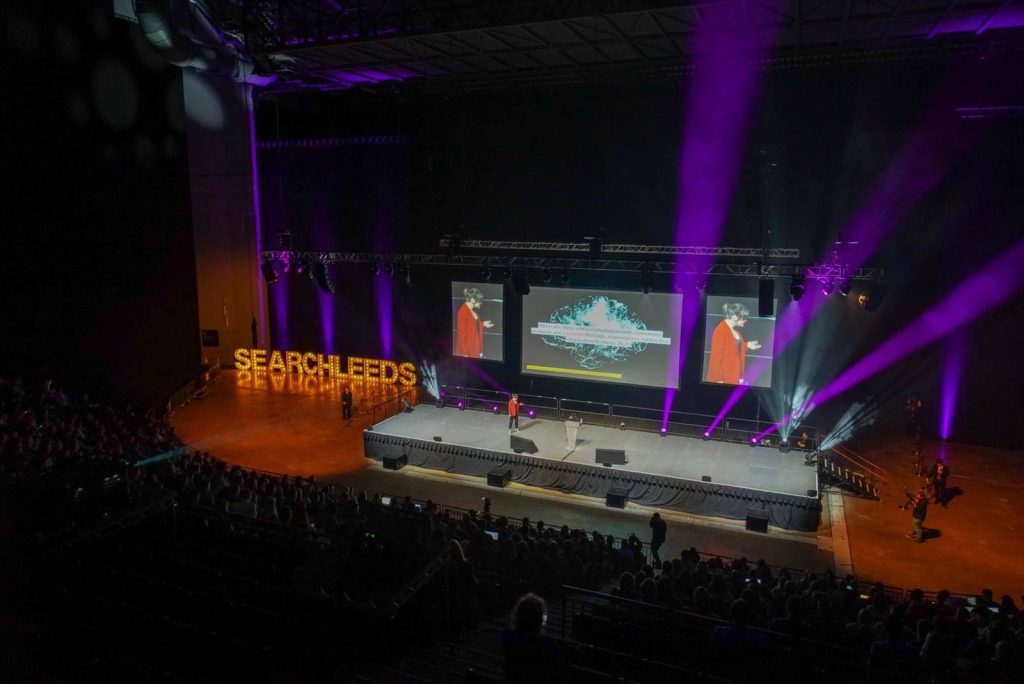So, it’s been exactly one week since the team at Colewood left the comforts of our office in Stockton for one day to attend the north’s largest search conference, Search Leeds.
Armed with notepads, pens and a readiness to learn, the team arrived for the event last Thursday along with more than 2000 other marketers, just as it began to drizzle. We entered the First Direct Arena in the heart of Leeds excited, if a little wet, but it certainly didn’t dampen our spirits.
As a second-time attendee, I was pleasantly surprised to see that the event had grown since the previous year. This time a fourth stage was added to the mix, giving more than 40 industry experts the chance to share their insights on all manner of subjects including SEO, PPC, Social Media, PR and more.
Proudly brandishing the tote bags we were given on arrival and clutching our free tea and coffee provided by the Search Laboratory, the team dispersed to the four stages to make sure we didn’t miss a thing! The talks kicked off at 9:30 am and continued until 5:00 pm, giving us a wealth of knowledge and inspiration from some of the finest minds in digital marketing.
One thing’s for sure, Search Leeds 2019 did not disappoint. So, here is our pick of the talks from the day and what the key takeaways were for us.
#1 KIRSTY HULSE – The Science of Creativity
My day began with a talk from Kirsty Hulse at the main stage. She got things rolling with a lively talk about how we can improve our creative thinking in order to cut through the saturated market of content and how we can get journalists to like our ideas.
I found this talk particularly inspiring because it included some pretty compelling evidence that suggests creativity is not something which you either possess or do not possess, but it is a skill that can be developed. You can train your brain to be more creative. There were some unquestionably useful tips for how to get more creative for your clients that we have taken back to Colewood headquarters. Not to mention a few well-timed jokes to keep the audience entertained.
Key takeaways:
- MRI scans show when evaluating brands, consumers primarily use emotions rather than information. Emotion enhances recall of a brand or product, and we should use our creativity to incite it.
- Creativity is a skill that can be learned, developed and applied (and the science agrees).
- There are a variety of exercises designed to help your brain think creatively and you should develop your own creative process.

#2 LUKE CARTHY – How to score big-hitting CRO and sales growth using an SEO crawler and custom extraction
This is a talk I was very sorry to miss after enjoying Luke’s appearance at last year’s Search Leeds. However, our Head of SEO Wayne Thompson managed to catch it. Here’s what he thought:
“Usually, web crawlers are used from a technical SEO perspective to assess how search engine-friendly a website is, and this talk showed you how you could gather data for CRO changes as well as crawl competitor’s websites to see what they were doing to be successful.
“Both of these concepts are really powerful because having the data to back up your CRO changes means they are more likely to become a reality. It allows you to assess the impact of changes at scale. Crawling competitor’s websites to get data on their products and services isn’t a usual activity, but given the examples, I can see how this would be really powerful data to use to get ahead of the competition.”
Key takeaways:
- Custom extraction allows you to scrape any data from the HTML of web pages when crawling.
- 35% of what consumers purchase on Amazon and 75% of what they watch on Netflix comes from product recommendations.
- Competitive e-commerce intelligence will help you boost conversions.
#3 BRITNEY MULLER – Machine Learning for SEOs
Britney Muller, Senior SEO Scientist at Moz gave an enlightening talk which dived into the potential of machine learning in our industry. There were some brilliant examples of how machine learning can solve SEO tasks, including an amusing demonstration of a tool that predicts words based on what you show it through your camera, which ended with Britney bravely giving her laptop to the audience to play with.
It was undoubtedly a buzzed-about talk, with Britney having made the trip from the US to speak. She discussed well how machine learning can help us take SEO to the next level with things like automated transcriptions, automated image optimisation, and even automated meta descriptions. Wouldn’t that save us a lot of time? Fascinating stuff. Also, Britney, we hope you got your laptop back!
Key takeaways:
- Machine learning is a subset of AI that combines statistics and programming to give computers the ability to ‘learn’ without explicitly being programmed.
- If machine learning was a car, data would be fuel and training data will get better.
- Diversity is paramount in machine learning.

#4 HELEN POLLIT – Discovering the Truth in Dark Data
As a multi-faceted digital marketing agency, we were happy to see a straight-forward talk that highlighted how your Google Analytics data cannot always be trusted. It explored how organic traffic can masquerade as direct, how internal UTM codes corrupt sources, and how some referral traffic can get too much credit.
This is something which is paramount to ensuring the insights you get from your data are accurate and based on truth because this allows you to drive more focused and reliable improvements to your marketing campaigns. Helen Pollitt’s insights on this subject were, without doubt, useful to us.
Key takeaways:
- Google Analytics isn’t psychic, be careful of misattribution.
- Utilise UTM codes on external links to your website (not internal links).
#5 LUKASZ ZELEZNY – The Butterfly Effect in SEO
For some of our team, an afternoon highlight was a talk given by Lukasz Zelezny. It was obvious Lukasz was an extremely experienced conference speaker, as his talk was not only extremely to-the-point and insightful but also super entertaining. Waking the audience up from the post-lunch lull in the day, he talked about some simple and sure-fire SEO changes to improve organic traffic and revenue.
In a world where people want results for their websites quickly, it was useful to explore how you can immediately boost your SEO performance and leverage limited resources for the best results.
Key takeaways:
- Use keywords that are already ranking quite well.
- Using links from social profiles work well because you mostly know who links to your social media profiles, it’s easy to switch a link from social profile to your website, and it’s also relevant to do so.
- Merge subdomains into a subfolder for huge gains.
Special Shout Out – Women in Digital
Amongst all the talks of the day, a stand-out part was the Women in Digital panels which took place on stage four. These panels made a statement in the normally male-dominated space and brought to the table topics like work-life balance, confidence and the industry as a whole and how women and minority groups are represented. It was great to see so many strong women discuss their struggles and how they cope with them in their lives.

There was a lot to take in at Search Leeds this year and overall, a lot to take away. Find a full list of slides from the event below. We’re looking forward to the next!
Search Leeds 2019 Slides
Main Stage:
Kirsty Hulse – Manyminds
How science can help you have better ideas
Bastian Grimm – Peak Ace
Jon Myers – Ascending Media
All things mobile in a mobile led world! Optimise or fail
Jennifer Hoffman – DeepCrawl
Gary Arnold – Edit
Personalisation in a Search journey
Matthew Howells-Barby – HubSpot
Everything you need to know before scaling your SEO internationally
Samantha Noble – Biddable Moments
Put your money where your data is
Sarah Barker – Stickyeyes
One Search – Combining your organic and paid strategies for greater effect
Britney Muller – Moz
Stephen Kenwright – Rise at seven
Content marketing frameworks that will get you paid more
Shyam Dattani
Search, the easy way: The content sales-person analogy explained
Barry Adams – Polemic Digital
JavaScript is ruining the web (and I love it)
Stage 2:
Sam Marsden – DeepCrawl
Overcoming Technical SEO challenges for enterprise sites
Alexandre Sigoigne – Myposeo
Build SEO content strategy based on SERP and competitive analysis
Luke Monaghan – Fetch
Site Speed: Time to meet the mobile expectation
Laura Bartlett – House of Coco Magazine
Why social media is more than just the numbers
Sophie Coley – answerthepublic.com
Will Hobson – Edit
Why social media should be part of your search strategy
Shannon McGuirk – Aira
Making headlines: Which newspapers are most likely to publish your content (with links!)?
Beth Nunnington – Journey Further
Oliver Brett – Screaming Frog
How to make fake new for links
Jill Quick – The Coloring in Department
UX and marketing: A tinder match made in heaven
Andy Duke – Stickyeyes
Rise of the Robots: How well can machines measure UX?
Stage 3:
Angus Hamilton – Search Laboratory
Leveraging your first-party data for successful cross-channel marketing campaigns
Helen Pollitt – Avenue Digital
Discovering the truth in dark traffic
Nichola Stott – Erudite
Emily Potter, Distilled
Featured Snippets – the achievable SERP feature
Rory Truesdale – WeWork / Conductor
Intent optimisation: Why it matters & how it can improve your SEO results
Jon Greenhalgh – Edit
AI in Paid Media and strategies you can use tomorrow
Puneet Vaghela & Sal Mohammed – Adzooma
Research and execution: Marketing’s most important relationship
Tanesha Stafford – Armchair Marketing
Land Grab: How to win business from your competitors with Google PPC
Hannah Perry – Manchester Airports Group
The multi-million pound keyword
Owen Gill – Pendragon
Who should bring PPC in house and who shouldn’t
Stage 4:
Luke Carthy – Mayflex
Killer CRO tips with a SEO web crawler
Rob Smith – DQ&A
Demystifying in-housing for advertisers and agencies
Fabrizio Ballarini – TransferWise
Building, hacking and killing a bespoke CMS
Lukasz Zelezny
Polly Pospelova – Delete
How to hack rankings with page speed optimisation
Laura Hogan, Milo’s Mail/JellyBean
There’s nothing wrong with being a vulture – using your competitors for SEO wins
Matt Holmes – Thomas Cook Airlines






